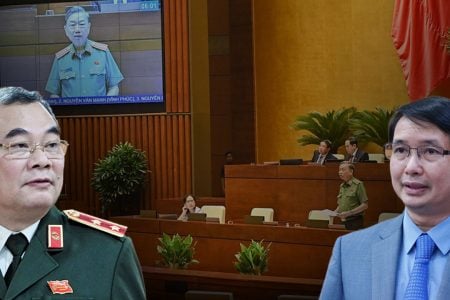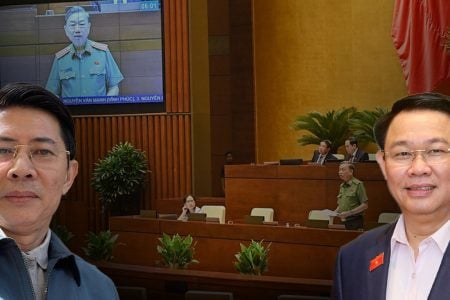Three important factors in coping with the institutional crisis are the capacity of the state, the role of the leader, and the society’s belief in the regime, of which the last factor is the biggest challenge for the Party.
The head: difficult power transfer
The head has a decisive role in the exercise regime. Whenever there is a crisis, the purification of the faction is accelerated to re-focus the power. Depending on the context in which the procedure may differ, in general, there are three important factors to respond to an institutional crisis: the head, the leadership of the ruling apparatus, and trust. of society, in which regaining social trust is the biggest challenge.
Institutional “instability” in Vietnam appears in political beliefs, and the peak took place during the 11th term of the Communist Party’s 11th Congress (2011-2016) when the economy was in crisis due to policy’s mistakes and executive growth hastily during Mr. Nguyen Phu Trong’s first term as the party’s General Secretary. The outstanding feature of “stability” is that the absolute leadership power of the General Secretary is “challenged.” The prime minister, according to Politburo, is responsible for the main responsibility. However, the disciplinary proposal was not accepted by the Central Committee. The principle of democratic centralized leadership is shaken.

General Secretary Nguyen Phu Trong, a veteran Politburo leader and “four pillars” long after the late General Secretary Le Duan, has successfully responded to “uncertainty” by using complicated rules. His courage and political experience helped him to be re-elected as the General Secretary of the Party for the second term (2016-2021) despite being beyond the age limit. Right from the beginning of his 12th term, he stepped up the reorganization of the party and at the same time a “burning furnace” campaign aimed at corrupt officials on “ideological and moral.” That helps him to continue in office in the current third term (2021-2026). He overcame the two-term limit inscribed in the Party’s Charter as a “special case of special.”
However, he was unable to lead forever due to his age and health. Therefore, the transfer of the position of General Secretary will inevitably be, but to whom it remains unknown. Currently, he is “confident” with concentrated power strong enough to consolidate his absolute leadership position and conduct reforms, in the immediate future, to build and operate a new governing apparatus.
State capacity: filling in power gaps
No one can rule alone. Regulating the party and building leadership is the next thing to do. The Party stated that the degradation of the “morality and lifestyle” of a large part of officials in the apparatus is serious, “eating everything from the people” to the point of threatening the regime’s survival. Therefore, General Secretary Nguyen Phu Trong has always emphasized “cadre work” as “the key of the keys” during his 12’s term. Controlling power is a priority, but the capacity of the State is necessary.
Completely renewed is not possible, “if the party disciplines all corrupted officials, there is no one left to work for the regime.” Hence, the screening has been carried out “cautiously” as the complex processes combined with the “burning the furnace” campaign continue, considering “easy to difficult” and the balance of power. At the same time with the discipline of thousands of leading cadres, the Party Central Committee has controlled personnel right from the party congress at all levels preparing for the 13th National Congress. Organizational tricks such as position rotation and rearrangement also happen often. The construction of an “institutional cage” to control power is also promoted, despite many obstacles.
Two hundred members of the Party Central Committee – the most powerful apparatus of the Party were selected at the 13th Congress as a result of internal rectification efforts under the leadership of Mr. Nguyen Phu Trong. He was assertive about the “plan” of personnel and expressed confidence in the leaked information of the “list” on social networks. He instructed “Do not leave a power vacuum” and promptly introduced key leaders to join the state apparatus for approval at the final session by the 14th National Assembly.

On March 5, the replacement of the “four pillars” positions has been completed. Mr. Vuong Dinh Hue was “elected” as the Chairman of the National Assembly to replace Nguyen Thi Kim Ngan, Mr. Nguyen Xuan Phuc was “dismissed” from the position of Prime Minister to become President, Mr. Pham Minh Chinh was taken as Prime Minister. Everything was organized by the Party according to the plan.
The Party decided on leadership personnel, so the above process at the last session of the 14th National Assembly showed that “formality” was still heavy. The aforementioned “Three Pillars” have been “sworn in,” but then this procedure will be repeated again when the 15th National Assembly gathers after its election scheduled on May 23. There is no democratic option, so the National Assembly is only a place to “legitimize” the Party’s power.
Social trust: the biggest challenge
Institutional crisis always leads to a decline in social confidence and, inevitable, an increase in instability. Three reforms may have to be carried out simultaneously: anti-corruption, economic growth, and social democratization. Although the urgent priority is to strengthen the party, the long-term and sustainable solution must be the restoration of confidence. This will be a great challenge for the Communist Party to reform.
The campaign against corruption, conducted by the Party itself, is like “kicking one’s own feet with stone” and is a violent solution, the regime governs by spreading fear for “deterring” officials. The movement of learning Ho Chi Minh’s moral example still carries heavy formality because the reality of life has changed dramatically. The campaign to “burn the furnace” has immediate and visible results that can ease people’s frustrations and bring a little hope for change but cannot restore society’s trust. Self-control, alienation of power, lack of political counterbalance institutions and a transparent accountability mechanism of the government, and people standing out are “precarious” factors foreseen of this policy.
How many phenomena reflecting the decline in social trust there are ways to lose it. The main cause is a corruption of public power, in which the abuse of violence can have serious consequences. The Dong Tam “incident” that happened at the beginning of 2020 is an example. From the frustrations with the authorities about the implementation of land policies and the way to resolve conflicts, some rural farmers in Hoanh, Dong Tam commune, established an “Anti-corruption Consensus Team” under the leadership of elderly Le Dinh Kinh, a party member with nearly 60 years of the party’s membership. As is well known, after the suppression of the authorities there were horrible deaths and many death sentences, and severe imprisonment. This incident sent a message of power and spread fear for “disobedience” but the government has lost society’s trust.
Responding to institutional crises is always complicated and difficult. Concentrating power and strengthening the ruling apparatus is an urgent task to maintain the regime. However, the whole political system depending on the head creates the risk of authoritarianism while maintaining a loyal system requires granting privileges and rents, building a strongly centralized state that can make citizens “smaller.”
Member of the 14th National Assembly Duong Trung Quoc, after 20 years of parliamentary activities, said “the last time” at the parliament of the 11th session that: The activities of the National Assembly have been “backward” to democracy compared to the 1st National Assembly of the former Democratic Republic of Vietnam. One of the “democratic debts” that Congress has to pay is the realization of the fundamental freedoms of citizens, which were constituted in the country’s Constitution 2013, but has always been delayed. Only when people are substantially allowed to participate in government activities, society’s beliefs can return to hope.
Thoibao.de (Translated)





























